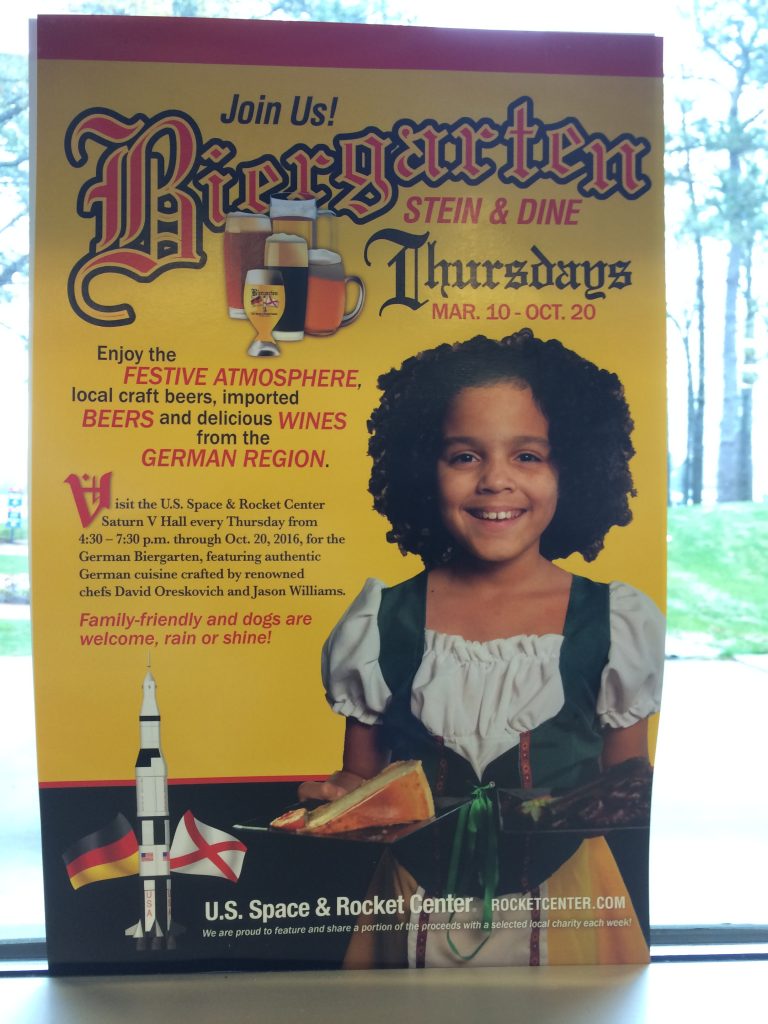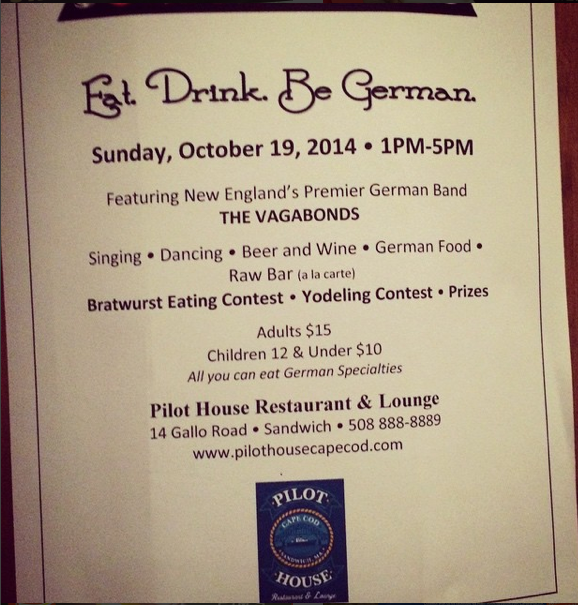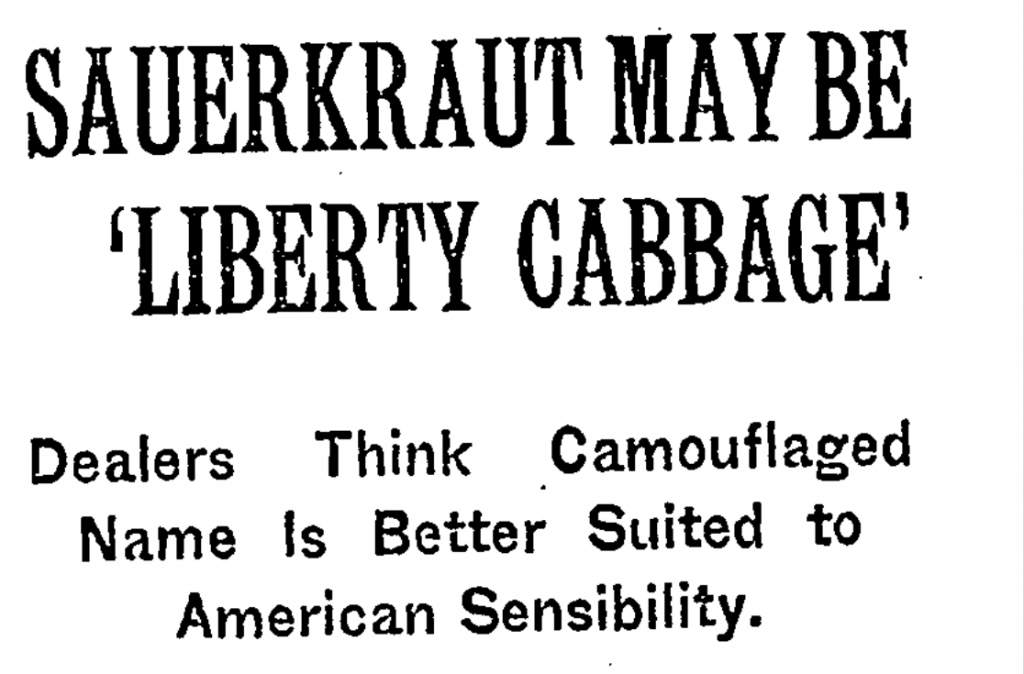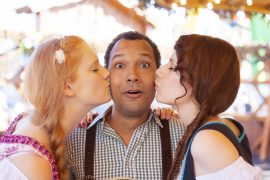
German cars, kindergarten, and noodles are remnants of the vibrant German culture in the US. What happened to German America?
It all began with a joke that wasn’t really a joke. “Catherine,” someone asked me, “did you know that Americans called French fries ‘freedom fries’ during the first Gulf War?” Of course, I didn’t know that. Honestly, the idea that Americans were mad enough at the French government for opposing the invasion of Iraq to rename their fries sounded quite silly to me. But, this made me think about other Americanized terms, such as sauerkraut being called “Liberty Cabbage” during WWI.
In 1910, Germany was the top birth nationality among US immigrants. Today, almost 50 million Americans can claim to have German origins, but very few of them demonstrate their heritage in daily life.
I remember visiting the Chevy Chase neighborhood in search of a suitable house for our family of seven. When my husband saw a sign for the realtor Kristin Gerlach, he suggested calling her. Her name sounded very German, which seemed like a good start for us.

But, Ms. Gerlach turned out to be a true American with long-forgotten German ancestors and she didn’t speak German at all. This realtor is just one example of the many Americans with long-lost German heritage. In fact, Wikipedia has dedicated a full article to prominent German Americans, which I found interesting:
From liberty cabbages to freedom fries
At the beginning of the past century, many US immigrants had German origins. German culture flourished in the American landscape with 488 German language daily or weekly newspapers around 1900, according to The New York Times.
“At the turn of the last century, Germans were the predominant ethnic group in the United States . . . New York City had one of the world’s largest German-speaking populations, trailing only Berlin and Vienna, with about a quarter of its 3.4 million people conversing auf Deutsch. Entire communities, spreading from northern Wisconsin to rural Texas, consisted almost exclusively of German immigrants and their children.”
German Americans also shaped the political landscape, as “Midwestern German-Americans were a backbone of the early Republican Party.”
Author Erik Kirschbaum explains in Burning Beethoven: The Eradication of German Culture that the number of German Americans contributed to America’s decision to stay out of World War I for so long. When the US finally entered the war, local resentment was high, and German Americans came “under intense, and often violent, scrutiny.”
Even German food was targeted. After a 75% decrease in sales, worried producers termed sauerkraut the Liberty Cabbage to improve its appeal.
WWI and the silencing of German Americans
While the US was involved in the war, Americans with German roots were accused of being spies or interned for various offenses. Approximately 30 people were killed by anti-German mobs, and “hundreds of others were beaten or tarred and feathered,” says The New York Times.
As a result, German Americans started to hide their roots. For example, President Trump, who claimed to have Swedish roots, actually has a grandfather from Kallstadt, a small German village. Some German Americans even changed their names. When President Eisenhower’s family migrated to Pennsylvania, their original name was Eisenhauer (German for “iron miner”). Others canceled their subscriptions to German newspapers, which started to disappear due to their dwindling readership.
The role of German Americans in modern culture
Today, there are more German Americans in the US than Mexican, Italian, or Irish Americans. But, besides Oktoberfest, what German traditions are left in the US?

In terms of cultural preferences, both Americans and Germans emphasize promptness, punctuality, and time management. Germans excel in military-style planning, while Americans are masters at organizing big events. Food has a similar place in both countries, and I suspect that many Americans and Germans would agree that “food is fuel” rather than a form of art or a source of pleasure.
In daily life, I suspect also that the success of German cars in the US is partially due to the presence of German blood in American veins. Today, few people remember that Heinz ketchup’s founder originally hailed from Germany, just like Steinway, Boeing, and Pfizer.
At least some German words remain in American daily life. Children still go kindergarten. American express overwhelming emotions through the term angst. Wiener and Frankfurter sausages are enjoyed by many Americans, as well as Gummi bears (Gummibär), noodles (Nuddel), pretzels (Brezel), seltzer, and strudel.
Perhaps, during WWI, German Americans paid the price of becoming fully assimilated in American society. Would you agree?
For more insights, just check out Erik Kirschbaum’s book:






As a first generation immigrant from Germany, my understanding of German culture is the willingness to work hard, do the job right (call it pedanticness) and be straight forward in communication. There is also a component of longterm planning. I don’t think these aspects of German culture are in the US they way I wish they were. However because they aren’t I’m much more competitive, so maybe that’s a good thing. 😁
I completely agree with you when it comes to longterm planning. Americans are impatient as soon as it comes to planning. Preparation is not as rewarding as doing! Thank you! It’s a good idea for a next post.
I live in Missouri and in some parts of my state there are many small towns that still have German activities and festivals, but as some people consider themselves German but have no idea of what German actually means. I Have come across many Missourians who classify themselves as their families ( 3 -5) generations back as coming from Germany. Let’s make this clear that there was no united Germany until 1871 and after that the German Empire was shaky. How many “so called” German families in the United States know exactly were their families came from “Was it a kingdom, as city/state or from one of the 112 previously independent territories. If their families emigrated prior to 1834 there were thirty-five monarchies of various kinds and four free cities (Hamburg, Bremen, Lübeck and Frankfurt). After 1834 to 1871 their was more consolidation of the kingdom/duchy/states. When a person indicates they are German do they practice or know the customs of the 16 Federal States that their families came from, since all of the areas are different.
At events I usually only see people looking like Bavarians and thinking all Germans ethnic orgins are the same, but they are not. What is a German.
In the early nineteenth century, Missouri played a central role in attracting Germans to the Midwest, perhaps most notably through Gottfried Duden’s widely read A Report on a Journey to the Western States of North America, which painted a romanticized picture of his time living on a Missouri farm in the 1820s. Beginning in that decade and continuing in larger numbers in the 1830s and 1840s, Germans from a variety of backgrounds settled in the state, particularly in St. Louis and the Missouri River valley. They came for many reasons, most often economic, but sometimes political. After a failed revolution across the yet to be unified German states in 1848, many political exiles immigrated to the United States, where some became prominent in politics and the press. By the start of the Civil War, Missouri had a substantial German immigrant population. Most Missouri Germans opposed slavery, and many played significant roles in the fight to keep Missouri in the Union during the war.
After the war, Missouri’s German American culture thrived. Missouri Germans held festivals, established beer gardens and breweries, performed in music clubs, built churches, and participated in politics. With the outbreak of World War I, however, German American heritage suddenly became a target of persecution. With the United States fighting Germany abroad, anti-German propaganda abounded at home. Many Missouri Germans participated in war bond drives or enlisted in the army as they strove to demonstrate their loyalty to the United States. During this time, many German American institutions such as newspapers and clubs went extinct or became dormant, and many German-language schools and churches switched to English.
Missouri’s German American culture proved resilient, however, with German American clubs and heritage organizations rebounding in the second half of the twentieth century. St. Louis, Hermann, Westphalia, and other historically German cities and towns retained and eventually celebrated their German heritage into the twenty-first century.
Thank you David for sharing the history of German-Americans in Missouri. Your point about (United) Germany in 1871 is very valuable.
New Ulm, Minnesota is “The Most German City in America”, where 67 % of the citizens claim Germanic ancestry, as proven by the 2000 census. German culture, traditions, food, and music all thrive here.
I remember pretty well the German community of the Twin Cities. Do you have any idea why German-Minnesotans had it easier to keep their tradition?
What was true in New Ulm in 1917-18 was not true elsewhere in Minnesota. In places where German immigrants were a solid majority, like New Ulm, German was the prevailing culture. Elsewhere, where Germans were in a distinct minority among “The English,” many Germans wisely became “Americanized” to save their hide and their businesses. It was tough on all Germans everywhere.
Michigan State has a lot of German roots and they try to make it stay alive. Frankenmuth is a German village also called Little Bavaria with its permanent Christmas market and German festivals, German hotels and restaurants.
We always have a great time with our German American friends at German Park in Ann Arbor during the monthly summer picnics with music, food and beer from Germany. The only thing that we’ve never seen in Germany is serving beer in sauerkraut bucket, I just don’t get it!
Links:
http://www.frankenmuth.org/
http://www.germanpark.com/
I believe there are indeed places in the US where German-ness is still alive.
Not later than yesterday, I talked with someone who talked pretty soon about his Italian roots. We talked and talked… I said that I have the German and French citizenship, no reaction. Much later, the conversation went on German-Americans not talking about their German heritage. Silence… It turned out that his grand father was German but that he knew nothing about it.